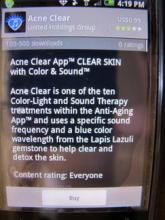The Federal Trade Commission says no, definitely not. On Sept. 8, the agency announced that it had reached settlements with two companies that were claiming their apps could cure acne. It is the first time the FTC has pursued any company making a health claim for an app.
"AcneApp" and "Acne Pwner" both claimed to be able to treat acne with colored lights that come out of the phone when the app is activated. Purchasers were told to hold the screen next to the affected area of skin for a few minutes daily.
But the FTC is having none of it. "Smartphones make our lives easier in countless ways, but unfortunately when it comes to curing acne, there's no app for that," said FTC Chairman Jon Leibowitz, in a statement.
According to the FTC, there were 3,300 downloads of AcnePwner, which was for sale in the Android Marketplace for .99 cents. AcneApp was downloaded 11,600 times from the iTunes store at a cost of $1.99.
The AcneApp makers claimed that the app was developed by a dermatologist and that its technology was backed by a study in the British Journal of Dermatology. Nope, not true, said the FTC.
The settlements bar the app makers from making acne-treatment claims and they were ordered to pay nominal fines. Koby Brown and Gregory W. Pearson, doing business as DermApps, have to pay $14,294, and Andrew N. Finkle, doing business as Acne Pwner, was ordered to pay $1,700.
The trade journal mobihealthnews reported that both apps had been removed from retail earlier this year or late last year. Mobihealthnews also noted that the New York Times gave the AcneApp some press in late 2009. Gregory Pearson is identified in that story as a Houston-area dermatologist.
But there are likely to be plenty more apps to scrutinize in the future.
A quick check of the Android marketplace from my smartphone found, "Acne Clear," from United Holdings Group, being sold at .99 cents. It supposedly "uses a specific sound frequency and a blue color wavelength from the Lapis Lazuli gemstone to help clear and detox the skin." United also markets a "Skin Cleanser" app that supposedly uses a sound frequency and "a yellow color wavelength from the Imperial Topaz gemstone to help clean the skin of dark spots, sun spots, and acne scars." It's also .99 cents.
There's also "SkinApp" from M&R Selected, which is free. It claims to allow users to do "color light therapy on the go." It is listed as having 10,000 to 50,000 downloads. The reviews are full of testimonials that it works, but also that it is just plain "bad."
What kind of review would you give these apps?
— Alicia Ault (on Twitter @aliciaault)


